
FOLIA PARASITOLOGICA
Scope & Guideline
Unveiling the Complexities of Parasitic Interactions.
Introduction
Aims and Scopes
- Diversity and Taxonomy of Parasites:
The journal extensively covers the classification, description, and phylogenetic relationships among various parasite groups, including helminths, protozoa, and myxozoans, contributing to the understanding of biodiversity in parasitology. - Host-Parasite Interactions:
Research published in FOLIA PARASITOLOGICA often explores the interactions between parasites and their hosts, focusing on aspects such as immune response, infection dynamics, and the ecological impact of parasites on host populations. - Molecular and Genetic Characterization:
A significant emphasis is placed on molecular techniques, including genetic characterization and phylogenetic analysis, to uncover the relationships and evolutionary history of parasitic species. - Epidemiology and Public Health:
The journal addresses public health concerns related to parasitic infections, providing insights into epidemiological studies, disease prevalence, and the impact of parasites on human and animal health. - Environmental and Ecological Studies:
FOLIA PARASITOLOGICA publishes research highlighting the role of environmental factors in shaping parasite communities and their dynamics, contributing to understanding the ecology of parasites in various ecosystems.
Trending and Emerging
- Impact of Toxoplasmosis on Human Health:
There is a rising trend in studies linking Toxoplasma gondii to various health conditions, including psychiatric disorders and COVID-19 outcomes, underscoring the significance of this parasite in public health research. - Molecular Epidemiology and Genotyping:
Research utilizing advanced molecular techniques for genotyping and epidemiological tracking of parasites is on the rise, particularly in studies concerning Echinococcus and other zoonotic parasites, emphasizing the need for precise identification and understanding of transmission dynamics. - Environmental Influences on Parasite Communities:
Emerging studies are increasingly focusing on the ecological and environmental factors influencing parasite diversity and distribution, reflecting a growing recognition of the importance of ecological contexts in understanding parasitism. - Novel Host Records and Species Descriptions:
There is a trend towards discovering and describing new parasite species and their novel hosts, highlighting the ongoing exploration of biodiversity and the need for updated taxonomic frameworks in parasitology. - Interdisciplinary Approaches in Parasitology:
Research integrating various scientific disciplines, such as ecology, genetics, and immunology, is gaining prominence, reflecting a shift towards holistic approaches in understanding complex host-parasite interactions.
Declining or Waning
- Traditional Morphological Studies:
There is a noticeable reduction in the emphasis on purely morphological studies of parasites without molecular corroboration, as advances in genetic techniques have shifted the focus towards more integrative approaches. - Studies on Less Common Parasite Groups:
Research on certain less common or less impactful parasite groups, such as specific monogeneans or lesser-known nematodes, has decreased. This may indicate a shift towards more globally relevant or economically significant parasites. - Generalized Host-Pathogen Dynamics:
Publications focusing on generalized aspects of host-parasite interactions without specific context or detailed mechanisms have become less frequent, as researchers increasingly seek to provide deeper insights into specific cases.
Similar Journals

Parasites Hosts and Diseases
Connecting Research and Practice in Parasitic InfectionsParasites Hosts and Diseases is an emerging academic journal focusing on the intricate relationships between parasites, their hosts, and associated diseases. Published by the Korean Society of Parasitology in collaboration with Seoul National University College of Medicine, this journal is a significant contribution to the fields of Infectious Diseases and Parasitology, and it has secured a place in the Q3 category for both disciplines as of 2023. With an ISSN of 2982-5164 and an E-ISSN of 2982-6799, this open-access publication aims to foster scholarly communication and provide a platform for researchers to disseminate their findings on critical issues related to parasitic infections and the pathogenesis thereof. Although it is still in the early stages of its history, the journal has already positioned itself as a useful resource within its field, with Scopus rankings showing it as 48th of 79 in Parasitology and 210th of 344 in Infectious Diseases, indicating its growing influence and the potential for impactful research. Situated in South Korea, and via its open-access model, Parasites Hosts and Diseases is committed to reaching a global audience of scientists, healthcare professionals, and students, all dedicated to understanding and combating the challenges posed by parasitic diseases.
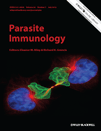
PARASITE IMMUNOLOGY
Pioneering Research on Host Responses to Parasites.PARASITE IMMUNOLOGY, published by Wiley, is a leading journal in the field of immunology and parasitology, with an ISSN of 0141-9838 and E-ISSN of 1365-3024. Since its inception in 1979, it has played a pivotal role in advancing our understanding of host-parasite interactions, immunological responses to parasitic infections, and the mechanisms of immunological resistance. The journal is adeptly positioned within the academic community, currently holding a prestigious Q2 ranking in Parasitology and a Q3 ranking in Immunology for 2023, indicating its significant influence and relevance. Its comprehensive scope attracts a diverse readership, contributing to the discourse surrounding novel therapeutic approaches and emerging challenges in parasitic diseases. With a consistent convergence of research until 2024, PARASITE IMMUNOLOGY is an essential resource for researchers, professionals, and students seeking to deepen their knowledge and foster collaboration in these dynamic fields. Although it is not an open-access journal, the insights shared within its pages are invaluable for shaping future research trajectories.
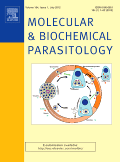
MOLECULAR AND BIOCHEMICAL PARASITOLOGY
Connecting Molecular Biology with Parasitology for Groundbreaking Insights.MOLECULAR AND BIOCHEMICAL PARASITOLOGY is a renowned journal published by Elsevier, focusing on the crucial intersections of molecular biology and parasitology. Since its inception in 1980, this journal has aimed to advance our understanding of parasitic organisms at the biochemical and molecular levels, providing a dedicated platform for researchers studying host-parasite interactions, parasite genetics, and diagnostic methodologies. Although it currently holds a quartile status of Q4 in Molecular Biology and Q3 in Parasitology for the year 2023, it remains a vital resource within the academic community, boasting a variety of research articles, reviews, and case studies that explore innovative treatment strategies and the molecular biology of parasites. Researchers and students alike can benefit from the journal's contributions to the field, despite its traditional publishing model, as the content remains pivotal for ongoing studies and advancements in parasitology.
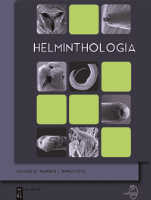
HELMINTHOLOGIA
Championing Open Access for Parasitology ResearchHELMINTHOLOGIA is a distinguished open-access journal published by SCIENDO, dedicated to advancing our understanding of parasitology and its relationship with animal science. Since its establishment in 1979, this journal has been a vital resource for researchers, professionals, and students in the fields of Animal Science and Zoology as well as Parasitology, featuring comprehensive research articles that span a diverse array of topics pertaining to helminths and their impact on host organisms. With an impressive impact factor and a commendable ranking in both Scopus categories (Rank #275 in Animal Science and Zoology and Rank #55 in Parasitology), it serves as a crucial platform for disseminating knowledge that informs both academic inquiry and practical application. Operating out of Poland, HELMINTHOLOGIA has embraced an open-access model since 2006, ensuring that its content is readily available to a global audience, thereby fostering collaboration and innovation in parasitic research.

Parasite
Leading the charge in parasitology research and knowledge sharing.Parasite is a distinguished open-access journal published by EDP Sciences S A based in France, specializing in the multifaceted field of parasitology and related disciplines. Since its inception in 1994, it has played a pivotal role in advancing research in Agricultural and Biological Sciences, Animal Science and Zoology, Infectious Diseases, Insect Science, and Veterinary Sciences, earning a prominent place in the academic community with its 2023 rankings placing it in the Q1 category for several key areas. With an impact factor reflective of its quality and engagement, the journal fosters a collaborative environment for researchers, professionals, and students to disseminate and access high-quality studies and reviews. Operating under an open-access policy since 2013, Parasite ensures that cutting-edge research is accessible to a global audience, thereby promoting knowledge sharing and innovation in the field. For more information, please visit the journal's homepage and explore its extensive repository of articles that contribute to the understanding of parasitic interactions and their implications in health and agriculture.
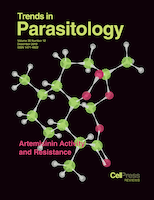
TRENDS IN PARASITOLOGY
Advancing the frontiers of parasitology research.TRENDS IN PARASITOLOGY is a premier academic journal published by CELL PRESS, focusing on the dynamic field of parasitology and infectious diseases. With an ISSN of 1471-4922, this esteemed journal is recognized for its high impact within the research community, boasting a Q1 ranking in both the Infectious Diseases and Parasitology categories as of 2023. This places it among the top-tier journals in the field, as evidenced by its remarkable Scopus rankings, where it ranks #3 out of 79 in Parasitology and #29 out of 344 in Infectious Diseases. Spanning over two decades of scholarly contributions from 2001 to 2024, TRENDS IN PARASITOLOGY emphasizes the latest advancements, challenges, and innovative methodologies in parasitology, making it an invaluable resource for researchers, healthcare professionals, and students alike. With an increasing focus on open access initiatives, this journal not only promotes widespread dissemination of knowledge but also encourages collaboration across the global scientific community. Whether you are investigating novel interventions, exploring parasite evolution, or understanding host-pathogen interactions, TRENDS IN PARASITOLOGY remains at the forefront of research, driving forward the understanding of parasitic diseases.
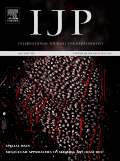
INTERNATIONAL JOURNAL FOR PARASITOLOGY
Illuminating the Path to Understanding Parasitic InfectionsInternational Journal for Parasitology, published by Elsevier Sci Ltd, stands as a premier platform for disseminating groundbreaking research in the fields of parasitology and infectious diseases. With an impressive impact factor represented by its Q1 quartile rankings in both Infectious Diseases and Parasitology for 2023, this journal commands significant attention within the scientific community. Operating since 1971, it has profoundly contributed to the understanding of parasitic infections and their implications for human health, occupying a distinguished position ranked #7 out of 79 in Parasitology and #64 out of 344 in Infectious Diseases according to Scopus metrics. Although the journal currently does not offer open access options, it ensures rigorous peer review and unparalleled academic integrity, providing researchers, professionals, and students with critical insights necessary for advancing knowledge and fostering innovations in parasitology. Together with its rich historical foundation and commitment to excellence, the journal is indispensable for anyone delving into the complexities of parasites and their impact on both host and ecosystem.
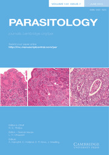
PARASITOLOGY
Exploring innovative insights into infectious diseases.PARASITOLOGY, published by Cambridge University Press, is a prestigious journal that has been at the forefront of research in the field of parasitology since its inception in 1908. This esteemed publication carries the ISSN 0031-1820 and E-ISSN 1469-8161, and its rigorous peer-reviewed articles provide insights into both fundamental and applied aspects of parasitic biology, infectious diseases, and host-parasite interactions. With a commendable impact factor, PARASITOLOGY ranks in the top quartile (Q1) for Animal Science and Zoology and holds Q2 rankings in both Infectious Diseases and Parasitology categories, indicating its significant influence and contribution to these disciplines. The journal's diverse scope allows for a broad range of research articles, reviews, and case studies, making it an essential resource for researchers, professionals, and students seeking to stay updated on the latest developments in the field. Based in the United Kingdom, PARASITOLOGY offers valuable access to critical research in an era where understanding parasitic diseases is more vital than ever, and continues to shape the future of this important scientific field.

SYSTEMATIC PARASITOLOGY
Exploring the intricate relationships between parasites and hosts.SYSTEMATIC PARASITOLOGY, a premier academic journal published by Springer, serves as a vital resource in the field of parasitology. Since its inception in 1979, this journal has committed itself to advancing the understanding of parasitic organisms and their interactions with hosts, thus playing a significant role in both basic and applied research. With an impactful contribution to the scientific community—evidenced by its Scopus ranking and its position in the third quartile (Q3) within the Parasitology category—the journal provides a platform for high-quality, peer-reviewed research that spans a variety of topics from molecular biology to ecology. Although not currently open access, SYSTEMATIC PARASITOLOGY remains essential for researchers, professionals, and students who seek to stay at the forefront of parasitological studies and contribute to ongoing developments in the domain. Published in the Netherlands, it continues to attract a diverse international readership, fostering a collaborative scientific environment.
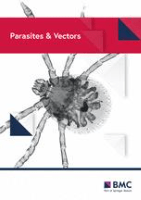
Parasites & Vectors
Leading the charge in parasitology and vector research.Parasites & Vectors is a leading open access journal dedicated to the dissemination of high-quality research on the vectors of infectious diseases and their parasitic agents. Published by BMC in the United Kingdom, this journal has been at the forefront of its field since its establishment in 2008, contributing to our understanding of vector-borne pathogens through its rigorous peer-reviewed articles. With a notable impact factor and categorized in the top quartile (Q1) in both Infectious Diseases and Parasitology, it is an essential resource for researchers, professionals, and students worldwide. The journal ranks impressively within various categories, holding a position of 7th out of 194 in Veterinary General Veterinary and 12th out of 79 in Immunology and Microbiology Parasitology, indicating its significant contribution to the sciences. Accessible to all, Parasites & Vectors supports the global pursuit of knowledge in epidemiology and disease control, making it an indispensable platform for sharing innovative findings and fostering collaboration within the scientific community.